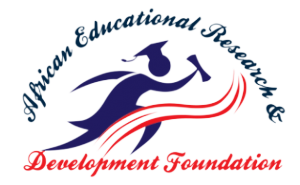IYAMU, Ewemade (PhD)1, EZIECHINE, Charity Uche (PhD)2
The purpose of this study was to examine the influence of human capital development on job performance of business educators in tertiary institutions in Delta State, Nigerian. A descriptive survey design was adopted for the study. Three research questions guided the study and two null hypotheses were formulated and tested at 0.05 level of significance. The study was conducted in the eight tertiary institutions where business education is being offered. These comprised of three Universities, two Polytechnics and three Colleges of Education. The population of the study comprised 175 business educators. The entire population was used due to its manageable size. The instrument for data collection was a structured questionnaire with 15 items. The instrument was structured in line with the research questions, with four-point rating scales of very high extent (VHE) 4 points, high extent (HE) 3 points, low extent (LE) 2 points and very low extent (VLE) 1 point. The instrument was validated by three research experts from Delta State University Abraka. The reliability of the instrument was determined through test retest method. The instrument was administered to a sample of 20 business educators in
Auchi Polytechnic Edo state who were not part of the sample as the entire population was used as the sample size. The first and second administrations were conducted within an interval of two weeks. Data obtained were analyzed using Pearson’s Product Moment Correlation Coefficient and a reliability coefficient of 0.90 was obtained, hence the instrument was considered reliable. Data collected were analyzed with mean and standard deviation while the null hypotheses were tested using independent samples ttest statistical tool. Findings revealed that training and development to a high extent influence on job performance of business educators. Based on the findings, the study recommends that the government should encourage on-the-job training programmes for business educators so as to enhance their knowledge and skills needed for effective job performance and that school authorities should adopt mentoring strategies in order to expose employees to the necessary work ethics and rudiments that could strengthen their performance and promote mentor/mentee relationship, thereby enhancing mutual
understanding and good work environment for effective performance and optimal
productivity among others.
Keywords: Human capital, training and development, on-the-job training, mentorship,
team-building and job Performance
Publication Date:
02/2024
Volume, Issue and Page Number:
Vol.5, Issue 1, Pg. 71 - 82
License:
Abstract
[Full Article]
1Department of Vocational and Technical Education, Faculty of Education,
University of Benin, Benin-City, Edo State
Email: ewemade.iyamu@uniben.edu.ng
2Department of Vocational and Technical Education, Faculty of Education,
University of Delta, Agbor, Delta State.
Email address: eziechinecharity@gmail.com

Subscribe To Us
You can subscribe to articles by our contributors and authors by filling in the form with your email address. Your research interest is our interest.
Designed & hosted by Be IT Specialists

